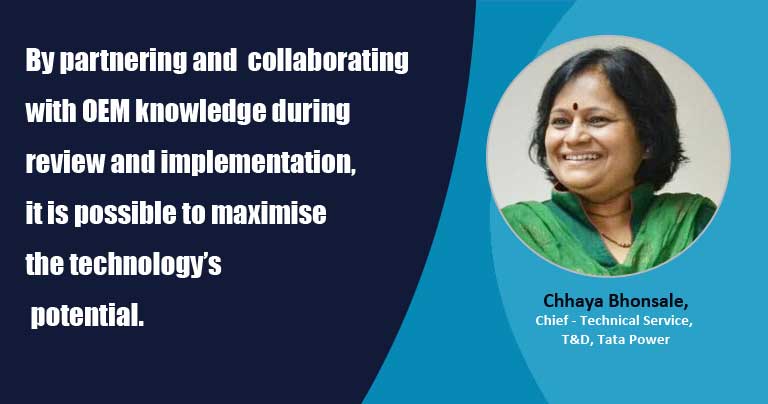Digitalisation in substation will lead to new horizons
By EPR Magazine Editorial November 15, 2021 5:16 pm IST
By EPR Magazine Editorial November 15, 2021 5:16 pm IST

Explaining us the benefits of digital tools and technologies in a power substation, Chhaya Bhonsale, Chief – Technical Service, T&D, Tata Power highlights very interesting points and facts that will create new horizons in the Indian energy sector.
How are the present energy trends impacting substation automation?
Energy consumption globally is increasing rapidly which is visible especially in the recent and present scenario how post-Covid energy demand has gone up in India and globally. Substations are crucial nodes of a power system. Substation automation provides protection, automation and communication capabilities as a part of comprehensive substation control and monitoring solution.
Migration toward the future transmission and distribution substation is taking place; because of the desire to bring more automation and intelligence to the power grid network, to address many utility concerns; like as how to reduce operational expenses to meet new regulatory requirements, increased reliability, early detection of faults and quick diagnosis and restoration, improved worker safety, and enhanced utilisation of grid infrastructure. This significantly drives the demand and growth of substation automation in the coming period.
Owing to the need for upgradation and replacing an aging energy infrastructure, substation automation is best solution as it allows automatic and quick restoration of supply during any equipment failure, and minimise outages and its effects. These requirements are expected to drive the market growth for substation automation further.
Further, digitisation and automation have been the focus areas for the Indian power grid over the last decade. During this period, the utilities in India, deployed IEC 61850-based grid substation automation as initial phase and now migrating towards-fully digitalised substation.
What will drive the demand for the digitalisation of substations in India?
The growth of the digital substation in the Transmission and Distribution network can be attributed to growing infrastructural development in smart cities, increasing power demand with limited space availability, increasing demand for replacing traditional substation infrastructure, and increasing interoperability and safety.
Automation within the substation brings more visibility on the electrical network to the grid operator on real-time basis. The more digitalisation in the substation level provides situational awareness of the equipment to operator/maintenance team for faster power restoration during fault and for data analytics post occurrence for further grid improvement to avoid such occurrences.
The digitalisation provide both tangible benefits such as reduction in space, reduction in copper cabling, less environmental impact (CO2 footprint) and optimisation in resources as well as nontangible benefits like improved personal and equipment safety, improved asset performance, lower fire hazards due to reduction of conventional wiring reduction in project commissioning time and least forced outage. These benefits will certainly drive the demand for digitalisation of substation in India.
Reliable power output and minimum T&D losses make the power sector stronger. What kind of digital products and solutions will help us achieve this?Substation automation refers to using data from intelligent electronic devices (IEDs), control and automation capabilities within the substation and control commands from remote users to control power system devices. The features of substation automation are monitoring and controlling of substation devices using modules such as intelligent electronic devices) (IEDs), RTUs, GPS receiver for Time synchronisation with two-way communication through Station Gateway/SCADA from central remote-control centre. The aim is to monitor and control the substation instruments to reduce the incidence and duration of power outages.
Implementing IEC 61850 standard at process and station bus level with digital protection and automation scheme through latest communication technology which will enhance the response within the substation as well as between substations. However, integration of technologies and additional systems like Smart Metering (AMR), Substation Automation System which covers Intelligent Electronics Devices (IEDs), SCADA System for remote Monitoring and Control, GIS (Geographical Information System) of network DAS (Distributed Acoustic system) for health monitoring of network; will help in attaining a reliable power output and reduce T&D losses.
How can digitalisation help smart grid operations and maintenance through substations?
In the energy sector, digitalisation is playing an important role in the smart electric grid. Digitalisation creates various opportunities to enable smart energy generation, transmission and delivery through a smart grid, as it is about information exchange and data availability to interested parties.
Moreover, digitalisation brings unprecedented benefits for O&M team and equally to the consumers for energy flexibility by making real time data available. The availability of data has provided opportunities for Operation and Maintenance team, for using data analytics to support and enhance the grid operations through capacity planning and peak power shaving, and facilitate deployment of new energy services such as energy audits, demand response programs.
Moreover, availability of real time data through digitalisation at Substation level will enhance the grid operation efficiency and availability and also facilitate the condition based maintenance
How are the state DISCOMs, utilities and government agencies responding to digital substation?
IEC61850 process bus based digital substation in widely accepted now and implemented by many utilities at least on pilot basis. Every utility may adapt this technology as per their operation philosophy. This technology reduces the risk of electrical hazards to operators, creating a safer work environment. However, few key challenges listed below are to be addressed jointly by OEM and Utility through methodical approach from design to delivery.
While progressive utilities including government utilities like PGCL are embarking on the journey of digital substations, state owned utilities (DICOMs), due to their poor financial health, face challenges in implementing the digital solutions owing to high initial costs involved. Privatisation of state distribution utilities may help to improve financial conditions of DISCOMs and progress towards digitalisation. However, suppliers should focus on R&D to reduce the costs down and build in interoperability among various supplies.
We use cookies to personalize your experience. By continuing to visit this website you agree to our Terms & Conditions, Privacy Policy and Cookie Policy.